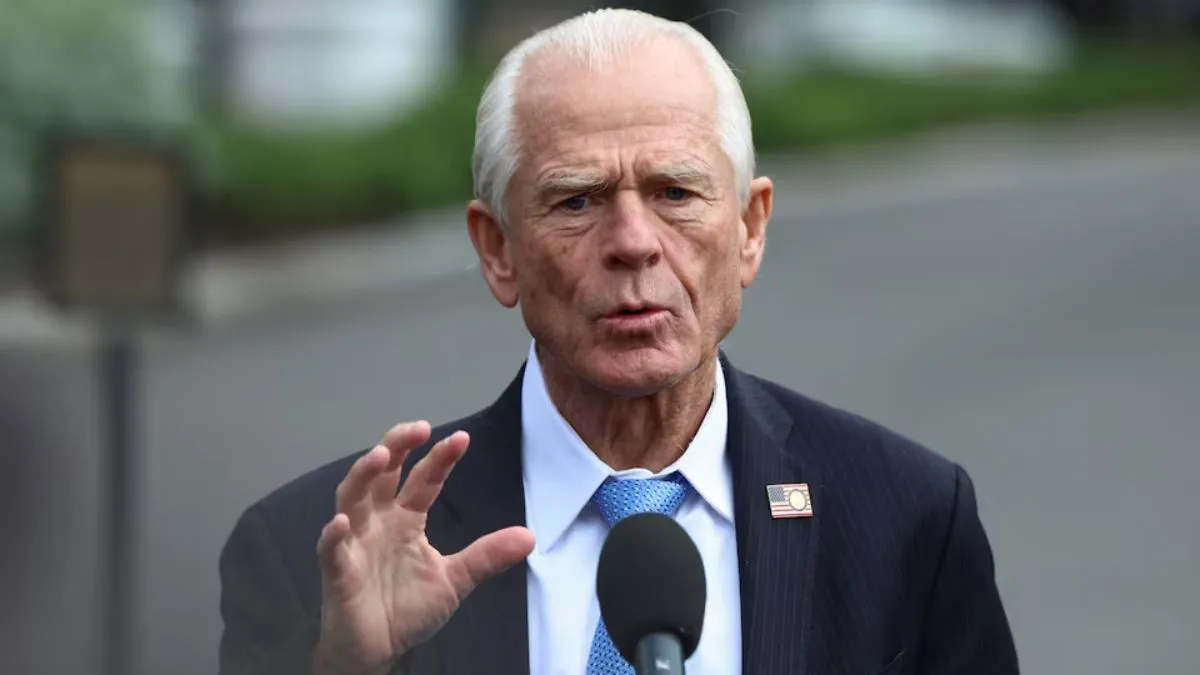- By Supratik Das
- Fri, 22 Aug 2025 08:25 AM (IST)
- Source:JND
US President Donald Trump's trade adviser Peter Navarro has launched a sharp attack on India’s continued import of Russian crude oil, charging New Delhi with operating a "profiteering scheme" that he described as a "laundromat for the Kremlin." The statement followed the imposition of 50 per cent additional tariffs on Indian goods entering the American market, a move that has induced increasing anxiety in New Delhi.
Navarro, who is one of Trump's most hardline voices on trade, explained to reporters outside the White House that India's increased imports of Russian crude were motivated not by energy security requirements, but by refining and re-exporting oil product profits. “Prior to Russia’s invasion of Ukraine in February 2022, India virtually bought no Russian oil. It was almost one per cent of their need. The percentage has now gone up to 35 per cent. They don’t need the oil. It’s a refining profit-sharing scheme. It’s a laundromat for the Kremlin. That’s the reality,” he said.
Navarro's "Maharaj of Tariffs" Jibe At India
Making a disparaging remark, Navarro called India the "Maharaj of tariffs," blaming it for high tariff and non-tariff barriers which, he said, harmed American workers and businesses. He justified Trump's move to raise tariffs on Indian products from 25 per cent to 50 per cent, terming it essential to balance both the trade deficits and India's energy relationship with Moscow. “What is the net impact on Americans because of our trade with India? They are Maharaj in tariff. We have higher non-tariff barriers, a massive trade deficit, and that hurts American workers. Then India takes the money from us, buys Russian oil, processes it, and profits, while Russia uses those dollars to fund its war in Ukraine. That is insane,” Navarro said.
Adding further tension, Navarro claimed India was "cosying up" to Chinese President Xi Jinping. His remarks came after Beijing's Foreign Minister Wang Yi travelled to New Delhi, with both sides agreeing to discuss the demarcation of their contested border. "India does not seem to wish to acknowledge its contribution towards the bloodshed. It's going warm to Xi Jinping. What India is doing is not making peace; it's extending the war," Navarro asserted. China, however, showed support for India, with its New Delhi Ambassador Xu Feihong saying that Beijing stands together with India to "maintain international equity and justice" in international trade.
India Defends Russian Oil Purchases
The Trump administration has stated that from August 27, a tariff of 50 per cent will be levied on Indian imports, adding a base 10 per cent duty, a reciprocal 25 per cent tariff, and another 25 per cent charge tied to Russian oil imports. The action is one of the strongest trade sanctions Washington has ever enacted against a major ally.
While India has consistently dismissed the allegation. External Affairs Minister S. Jaishankar, while visiting Moscow recently, emphasised that New Delhi takes decisions in the interest of the nation and its energy security for 1.4 billion Indians. He reminded that the US itself had previously urged India to assist in stabilising energy markets globally after Western sanctions had affected oil supplies. “We are a country where the Americans have said for the last few years that we should do everything to stabilise world energy markets, including buying oil from Russia. So, we are perplexed by the logic behind these tariff threats,” Jaishankar said. India has also highlighted that it is not the largest purchaser of Russian oil. “China is the biggest buyer of Russian crude, while the European Union remains the largest importer of Russian LNG. We are neither,” Jaishankar noted, underlining that Indian refiners buy from multiple sources, including the United States itself, whose exports to India have significantly grown.
The high tariffs have also drawn criticism within the US. Former UN Ambassador Nikki Haley warned that weakening India ties would be a “strategic disaster” for America, stressing that New Delhi should be treated as a “prized free and democratic partner” in the effort to counter China’s growing influence. Renowned economist Jeffrey Sachs described Trump’s tariff decision as “bizarre and self-destructive,” warning that it could push India closer to Russia and China, while damaging US strategic interests. “This is not a strategy, but sabotage,” Sachs said, adding that the move has already helped unify BRICS nations. Russia, too, has slammed Washington’s unilateral action. Roman Babushkin, Charge d’Affaires at the Russian Embassy in New Delhi, called the US tariffs “unjustified” and said they would “destabilise global markets.”
India’s Ministry of External Affairs (MEA) has reiterated earlier that it will “take all necessary steps to safeguard the national interest,” including ensuring stable energy supplies. In a statement, the MEA said, “Our imports are based on market factors and aimed at ensuring the energy security of 1.4 billion Indians. Unfortunately, the US has chosen to penalise India for actions that many other countries, including its allies, are also undertaking.” Despite the strong rhetoric, Indian officials have signalled openness to dialogue. With tariffs due to take effect next week, the coming days will test the resilience of the India-US partnership, as both sides balance energy needs, geopolitical rivalries, and economic pressures.
With inputs from agencies.
